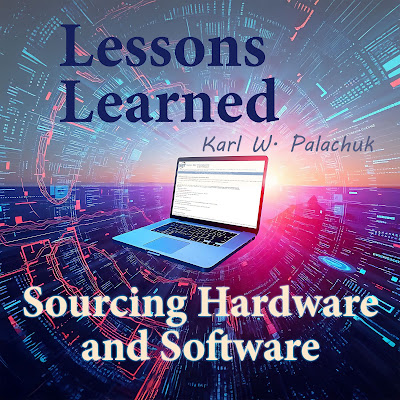Finding Sources for Hardware and Software
This is episode 11 of the ongoing Lessons Learned series. For all the information, and an index of Lessons Learned episodes, go to the Lessons Learned Page. https://blog.smallbizthoughts.com/p/lessons-learned-blog-series.html
-- -- --
Today's topic: Finding Sources for Hardware and Software
When I started consulting, I had to find places to buy the hardware and software that I would sell to clients. This definitely falls into the category of knowledge that seems easy many years later, but was quite confusing at the time.
Luckily, I had a friend who was both my tax advisor and an all-around good business advisor. While he did not sell merchandise, he knew what I needed to do. The first step was to educate myself on the California Sales Tax process. I need to get a seller's permit. This goes by different names in different states. Basically, it allows me to buy things without paying sales tax, and to then charge sales tax to clients.
This sounds simple. And maybe it is in some states. In California, we have fifty-eight counties, each of which can charge a different sales tax. And then we have school districts, utility districts, and other special districts - each of whom can charge additional taxes. So, "sales tax" can vary zip code by zip code. I soon had clients in five counties around where I lived, and they represented more than five tax districts. Those numbers grew significantly over the years.
So, the tax situation may not have been simple, but it was easy to understand. Sourcing hardware was another story.
I had a client that worked a lot with point of sale systems. (See Episode Five.) I asked him how he sourced cash registers, scanners, PCs, etc., and he pointed me to a company called Merisel. In part because of my connection with that client and his distributors, I comfortably slipped into selling point-of-sale systems to clients.
Of course, I wanted to get some credit with Merisel, and that took me some time to earn. Early on, I had to prepay for everything. I *should* have learned early that I need to be prepaid for everything, but that lesson was years down the road.
Eventually, Merisel went out of business and was bought up by Synnex (now TD Synnex). So, I had no problem becoming a Synnex distributor, although I probably didn't qualify if I tried to apply without the Merisel account.
The real problem I had was that my volume was too small to get a decent price on anything. A printer might sell for $399 to the public, and my price would be $395 plus shipping! So I'd lose money on the deal.
Then two things happened. First, I learned that local sources would give me a better price. Second, I found out how to become a premium reseller.
Many stores, including Sam's Club, Graybar, Office Depot, and now-defunct Circuit City and Fry's Electronics would let me register my reseller's permit and give me a price break. There wasn't much profit, but I could source products. So I was happy.
In talking to an acquaintance about this, I got some golden advice that has served me well. He told me, "You need to be a premium reseller." I asked what that was and said, "It's simple. No matter what you have to pay for something, you sell it at a premium."
The basic advice amounts to this:
1) Ignore what anyone else is selling something for, and
2) Charge your preferred markup. Plus,
3) Never explain, apologize, or justify your price. The price is the price.
That is some of the best advice I ever got. Even if I had to buy a printer at $395 plus shipping, I took that total times 1.25 to get my price. Thus, no matter what I sold, I marked it up 25% and rounded up from there so the price ended in 9.99.
On rare occasions, someone asked me about the price. But that was truly rare. Most of the time, people just paid it.
Over time, I tweaked this a bit. Sometimes, my formula resulted in a price well below the MSRP (manufacturer's suggested retail price). In those cases, I adjusted the price up, but just below MSRP. In those cases, I was making a greater-than-average margin and selling below retail.
This was often the case with cables and accessories. All that "little" stuff was hugely profitable. A printer might not earn me much, but the markups on printer cables, toner, and paper were astronomical.
Looking back, I spent way too much time trying to find/buy/sell products. I should have charged the clients by the hour to help them find the stuff. I might not t make any money on hardware and software, but I would have made a lot more on labor. Oh well.
-----
Next week, I cover one of the most important lessons I've ever learned. In fact, it might be THE most important lesson I ever learned in the IT industry.
Up next . . . Regular Monthly Maintenance
Subscribe to the blog so you don't miss a thing.
:-)









No comments:
Post a Comment
Feedback Welcome
Please note, however, that spam will be deleted, as will abusive posts.
Disagreements welcome!